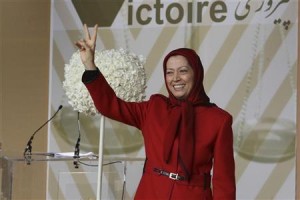 (Reuters) - French lawmakers invited the head of a previously shunned Iranian dissident group to parliament on Wednesday, aiming to help it gain credibility as a viable opposition to Tehran's government.
(Reuters) - French lawmakers invited the head of a previously shunned Iranian dissident group to parliament on Wednesday, aiming to help it gain credibility as a viable opposition to Tehran's government.
Speaking to members of a parliamentary committee on Iran, Maryam Rajavi, leader of the Paris-based National Council of Resistance of Iran (NCRI), said it was time her group was taken seriously as a force for democracy in Iran.
"The biggest political error in the West is to ignore the key movement of change in Iran," Rajavi told the conference.
France, a permanent member of the U.N. Security Council, has been one of the most vocal proponents of tougher sanctions against Iran, which it suspects of trying to develop a nuclear bomb.
"International sanctions are positive steps. But they will only be effective if the West changes its policy vis-a-vis the resistance," said Rajavi, whose group is also known as the Mujahadin-e-Khalq (MEK).
The U.S. state department removed the NCRI from its official list of terrorist organizations in September in what Rajavi then hailed as a key blow to the clerical regime that has ruled Iran since its 1979 Revolution.
The group - which fought alongside Saddam Hussein's forces in the 1980s Iran-Iraq war - led a guerrilla campaign against the U.S.-backed Shah of Iran during the 1970s, including attacks on American targets.
The NCRI calls for the overthrow of Iran's clerical leaders and wants the West to maintain diplomatic relations with Tehran only if it stops executions and torture. It also wants Iran's human rights record put in front of the U.N. Security Council.
The French government has no official contact with the NCRI.
Attending Thursday's conference was former U.S. Congressman Patrick Kennedy, who said France's early leadership in Libya's conflict and France's official recognition in November of Syrian rebels were important precedents for a new policy towards Iran.
"I call on my French friends to once again be leaders and recognise the Iranian resistance of the MEK and ... Maryam Rajavi as she seeks to bring democracy and human rights to her country inIraq," Kennedy told the conference.
"The Arab Spring will not be a true Arab spring until it comes to the troubled country of Iran," said Kennedy, the son of former U.S. Senator Edward Kennedy and nephew of former President John F. Kennedy.
Other U.S. public figures who had supported the group's removal from the terrorism list included former CIA Director R. James Woolsey and former FBI Director Louis Freeh.
By Reuters
The Iran Project is not responsible for the content of quoted articles.

 QR code
QR code